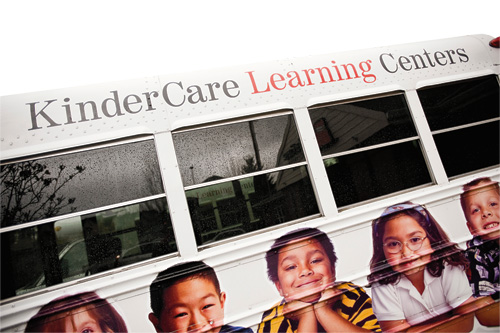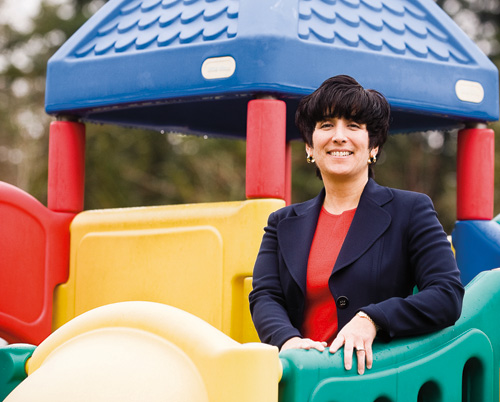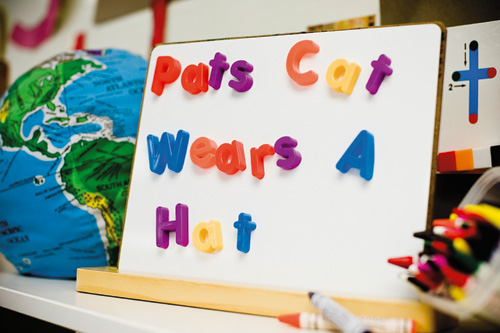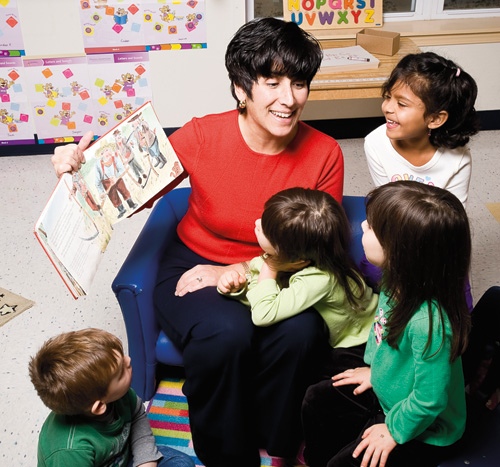 Knowledge Universe is the largest private provider of early childhood education services in the country. Its ambitions don’t stop there.
Knowledge Universe is the largest private provider of early childhood education services in the country. Its ambitions don’t stop there.
STORY BY LINDA BAKER // PHOTOS BY LEAH NASH
On the second floor of a KinderCare center in downtown Portland, eight preschoolers are coloring pictures of Chinese characters while listening to their teacher speak in Mandarin. On the other side of the room, which is decorated with parasols and Chinese lanterns, another group is interacting with a different teacher — who is speaking in English. Eventually the groups will switch, with the entire class spending half the day learning in Chinese, the other half in English.
Now in its third year, the Mandarin immersion program got its start when Knowledge Universe, KinderCare’s parent company, came across a model program while scouting acquisitions in Singapore. “We thought this was a really innovative and important way to deliver dual language, which is something the United States is particularly remiss in,” says Elanna Yalow, executive vice president at Knowledge Universe. “It is much easier to develop second-language competency at a young age,” Yalow says. “So we brought that program over and implemented it in several locations.”
KinderCare’s Mandarin immersion program is a window on the world of Knowledge Universe, a global education services conglomerate that has its U.S. headquarters in Portland. The company, which employs 40,000 people on three continents, is the largest single private provider of early childhood education services in the country. It also has the biggest market share in the United Kingdom, Malaysia and Singapore, where the company’s global headquarters are located.
 |
Felicia Thornton is Knowledge Universe’s Portland-based CEO for U.S. operations. KU is the leading player in a market expected to be worth $39 billion by 2015. |
Founded by former junk bond king Michael Milken and his brother, Lowell Milken, in 1996, Knowledge Universe, which earned $1.6 billion in revenue last year, targets early childhood learning programs. But the company also oversees or has a stake in business units in K-12, online and post-secondary education. “We are cradle to as-long-as you-are-a-lifelong-learner,” says Felicia Thornton, Knowledge Universe’s Portland-based chief executive officer for U.S. operations. Like the Mandarin program, the broader corporate mission is based on global best practices, Thornton says.
“When you look at Singapore, you realize they don’t differentiate early childhood from K-12 or university,” says Thornton. “They look at that entire continuum as critically important.” Singapore’s growth rate is 20%, she adds. “It’s not by natural resources, not by anything other than investment in human capital. It’s just staggering.”
Knowledge Universe isn’t alone in touting the benefits of high-quality education, especially early childhood education, as the key to a nation’s economic success. As concerns about U.S. educational performance and lack of competitiveness mount, state and national leaders — from Kitzhaber to Obama — are calling for universal preschool as a centerpiece of education reform. These initiatives would build on existing state-funded preschool programs, which already serve more than 1 million 3- to 4-year-olds around the country.
In this environment, private sector innovation is only one part of the company’s business. One quarter of the 200,000 children Knowledge Universe serves in the U.S. receive a child care subsidy for low-income families, a reflection of the changing nature of for-profit care in this country, and the public-private partnerships that may become the signature of early childhood education initiatives.
Such alliances are vulnerable to the recession. They also spotlight the role of the for-profit sector, not always a welcome participant in the K-12 arena, in shaping the public preschool agenda. But with its global footprint, lofty rhetoric and socioeconomically diverse client base, KU is plowing ahead, carving out a niche in a market that by 2015 is expected to exceed $39 billion a year, according to Global Industry Analysts.
 Few people in Portland might realize that Knowledge Universe is one of the city’s largest employers, with about 1,400 employees working in its Lloyd District headquarters and in 29 centers around the state operating under the KinderCare, Knowledge Beginnings and Children’s Creative Learning Center (CCLC) brands; the latter is the company’s employer-based child care division. In a boost to the local economy, Knowledge Universe opened a new Portland customer service center last August, employing 120 people. A few months later, CCLC opened the new “Healthy Starts” center in partnership with OHSU in the emerging South Waterfront district.
Few people in Portland might realize that Knowledge Universe is one of the city’s largest employers, with about 1,400 employees working in its Lloyd District headquarters and in 29 centers around the state operating under the KinderCare, Knowledge Beginnings and Children’s Creative Learning Center (CCLC) brands; the latter is the company’s employer-based child care division. In a boost to the local economy, Knowledge Universe opened a new Portland customer service center last August, employing 120 people. A few months later, CCLC opened the new “Healthy Starts” center in partnership with OHSU in the emerging South Waterfront district.
Nationwide, Knowledge Universe oversees six brands including KinderCare, the company’s largest division, which operates 1,636 centers serving infants through school age; “Champions,” an afterschool science enrichment program and summer camp; and two small preschool providers: Cambridge Schools in Florida, and the Grove School in Texas and North Carolina. The Child Care Marketplace, a one-stop shopping consortium for child care providers, is one of the company’s few noninstruction-based business units.
The vision doesn’t stop at the border. In KU’s grand scheme, the conglomerate isn’t just a collection of disparate brands, but a kind of vertically integrated corporation with global companies working toward a common goal. “What makes us fortunate is the breadth and diversity we have to reach out to educators,” says Yalow, adding that the U.S. program “is constantly being refreshed and upgraded as we are integrating what’s new in research or seeing from our international partners.”
Yalow ticks off a few examples of Knowledge Universe cross-pollination. Some Knowledge Beginnings and CCLC centers are using “smart boards,” an interactive white board, to deliver online content developed by K-12, an online school Knowledge Universe oversees as a majority shareholder. The Grove School and Odyssey, a Singapore based preschool, share an interest in environmental sustainability. Then there is KinderCare’s language immersion program, which started in Pat’s Schoolhouse, a Singapore-based preschool acquired in 2007.
The trans-Pacific currents flow both ways. A study group from Singapore and Malaysia recently toured Knowledge Universe programs in Southern California, and plans to adopt some of the core curriculum developed by the company’s education team in Portland, Yalow says.
A privately held company, Knowledge Universe does not disclose financial information beyond its gross revenues and it is often difficult to get past the company’s ubiquitous corporate messaging, which repeats themes such as “talent, innovation and quality” but leaves out crucial details such as companywide teacher pay and turnover rates. Nevertheless, early childhood education experts familiar with the brands say in many cases the company’s centers live up to the hype.
For-profit child care has come a long way since the 1980s when KinderCare, then a pioneering company, was derided for making profits off kids and branded with the tagline “Kentucky Fried Children.” In its early days, KinderCare quality “was at various levels,” says Roger Neugebauer, publisher of the Child Care Information Exchange, a management magazine for childcare providers. Not today, says Neugebauer, “KinderCare has great staff training and a drive to make their centers the best in the community.”
 |
A cooking class at KinderCare in Cedar Hills teaches children the importance of health food. From left: Lukas, Malaika, Jillian and Jake prepare garden kabobs for lunch. |
 |
 |
Will Parnell, a professor of early childhood education at Portland State University, says KinderCare isn’t typically considered one of the city’s top-ranked practitioners, a category often reserved for well-funded employers or university-sponsored centers such as PSU’s Helen Gordon Center or Nike’s Joe Paterno child development center. But “maybe we could” include KinderCare in those ranks, Parnell says. He noted that many of KinderCare’s centers are certified by the National Association for the Education for Young Children. That’s “a tough thing to accomplish,” he says. The company “is really diving into child development and best practices.”
Knowledge Universe’s CCLC division operates precisely the kind of employer-sponsored centers Parnell lauds, including facilities for Stanford University, and in Portland, Fred Meyer and Oregon Health & Science University. The latter features a state-of-the-art indoor playground connected to the outside by sliding doors, smart-board technology and like all CCLC centers, an eco-healthy certification from the Oregon Environmental Council.
With its focus on technology, sustainability and foreign language (KinderCare even offers an anti-obesity enrichment program, Active Adventures) Knowledge Universe is positioning itself as a solution to the myriad woes facing U.S education. The company lobbies state and national governments to strengthen child care standards and last year joined Change the Equation, a collaboration between the White House and CEOs of 100 companies to cultivate widespread literacy in science, math and technology. “We strongly support setting quality expectations,” Thornton says. “It’s not just for us —but for states and industry.”
But if what’s good for Knowledge Universe is good for the country, KU has its challenges — namely, while corporate operations may be seamless, the market they are operating in is anything but. Unlike K-12 programs, child care providers are a mixed group, ranging from grandmothers, churches and small family providers to independent nonprofit and for-profit day care centers. And while Knowledge Universe may be a big fish it’s swimming in an even bigger ocean. Consider, for example, that after KinderCare, Learning Care Group, based in Michigan, is the country’s second-largest provider, with 1,136 sites. Massachusetts-based Bright Horizons, the third-largest, operates 730. In total, the big three comprise only 3% of the market.
In an already fragmented market, public schools are also starting to provide preschool programs, a move that has “inhibited growth” of for-profits in recent years, Neugebauer says. Between 2005 and 2009, state funding for prekindergarten increased from $2.9 billion to $5.2 billion, and pre-K is now the fastest-growing sector in public education, according to a 2009 report by the Pew Center for the States.
The recession has also left its mark on private-sector providers. Although Knowledge Universe went through a period of major acquisitions mid decade, company growth has remained flat over the past few years, Thornton says.
As the child care sector becomes more competitive, companies such as KinderCare, which used to serve only fee-paying parents, now aim to serve a broader demographic, Neugebauer says. “It’s a survival strategy,” he says. In Oregon, for example, most Knowledge Universe centers enroll families participating in the Employment Related Day Care program, a state child care subsidy. KinderCare also partners with the Mt. Hood Community College Head Start program to operate a classroom for low-income kids. “If you walked in the door, there would be no way for you to know,” says Thornton. “It’s about quality education and the socioeconomic piece should be irrelevant.”
Most policy experts agree that such collaborations provide more kids with high-quality child care options. But these public private partnerships are also “very different” from the public K-12 education model, says Steve Barnett, co-director for the National Institute for Early Education Research. Despite the growth of charter and online schools, K-12 districts rarely subcontract core services to the private sector. And in the K-12 arena, corporate resumes are not always met with enthusiasm. Witness the outcry over New York Mayor Michael Bloomberg’s recent appointment of Catherine Black, a corporate executive with no education or public sector background, as chancellor of New York City schools.
A former chief financial officer of Albertsons, a grocery story chain, Thornton does not have a background in education, nor does CEO for global operations Peter Maslen, the former president of Starbucks Coffee International. Other members of the executive team, such as Yalow, do have a background in early childhood pedagogy and research. Nevertheless, the company’s financial management roots date back to its controversial founder Milken, who served two years in federal prison for illegal trading and other market manipulations in the early 1990s. Since then he has focused on charitable and educational endeavors, among them the Milken Family Foundation, known for its annual public educator awards.
Today Milken is chairman of Knowledge Universe, but he has no day-to-day responsibilities, Thornton says. “He’s absolutely passionate about education,” she says.
Knowledge Universe maintains a relatively low profile in Portland. Until recently, most of its corporate philanthropy — partnerships with Schoolhouse Supplies, SMART board representation — was conducted in the name of company brands, which are better known in the community than Knowledge Universe, Thornton says. That strategy goes beyond philanthropy. It also underscores the dual world in which Knowledge Universe operates. Child care is an intensely personal decision for most families, but those decisions, warn business and political leaders, also determine the country’s future in an increasingly globalized marketplace.
Last year, a Silicon Valley high-tech company and CCLC client asked Knowledge Universe to provide a similar program for its employees in India. “They had already selected another provider in India but the challenge was India traditionally does not have infant and toddler programs,” Thornton says, adding that Knowledge Universe is now running the center after conducting immersion training for local staff.
 |
Before getting into early childhood education, KU CEO Felicia Thornton held executive positions with food companies including Albertsons and Kroger. |
What is the moral of that story? “We’re seeing that child care is no longer a benefit just for headquarter employees…but more broadly for all employees,” Thornton says. For Knowledge Universe, quality early childhood education may depend on “Miss Jane” — as Thornton puts it — but the bigger picture is workforce development and human capital.
Without quality early childhood education programs, it’s impossible to recruit talent. Without quality early childhood education programs, it’s impossible to develop future talent. And in case the global citizenry doesn’t understand the ramifications, Knowledge Universe is ready to explain.


